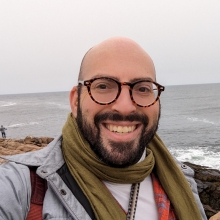
Sonny Bleicher is an evolutionary ecologist and environmental scientist. His teaching experience includes courses in organismal biology (such as biodiversity, ecology, biogeography and evolution) and environmentally focused courses (such as conservation biology, environmental policy, urban ecology, and field methods). As an interdisciplinary scientist Dr. Bleicher is a polyglot for all things science and enjoys discussing all things science, and science philosophy, with students across all academic disciplines.
Recent Publications
- Jackson, M.A., S.S. Bleicher. 2024. Meta-analysis reveals behavioral plasticity, not agonistic behavior, facilitates invasion of brown anoles (Anolis sagrei) and replacement of green anoles (Anolis carolinensis). Diversity (in press).
- Human-wildlife conflicts and sensory disinformation, a review of evolutionary trajectories caused by human land-management and rapidly expanding urban landscapes. Journal of Urban Ecology (in press).
- Bleicher, S.S. and Dickman, C.R. 2020. On the landscape of fear: Shelters affect foraging by dunnarts (Marsupialia, Sminthopsis spp.) in a sandridge desert environment. J. Mammal., 101: 281–290.
- Bleicher, S.S., Kotler, B.P., Shalev, O., Austin, D., Embar, K., Brown, J.S., et al. 2018. Divergent behavior amid convergent evolution: A case of four desert rodents learning to respond to known and novel vipers. PLoS One, 13: 1–17.
- Bleicher, S.S., Brown, J.S., Embar, K. and Kotler, B.P. 2016. Novel predator recognition by Allenby’s gerbil (Gerbillus andersoni allenbyi): do gerbils learn to respond to a snake that can “see” in the dark? Isr. J. Ecol. Evol., 62: 178–185.
Degrees
Ph.D.: Ecology and Evolutionary Biology, University of Illinois at Chicago, Biological Sciences. 2014. Chicago, IL, USA M.Sc.: Dryland Ecology, Ben Gurion University of the Negev, Desert Studies. 2012. Beersheva, Israel B.S.: Environmental Sciences, Roc
Classes Taught
Investigating Nature
Areas of Expertise
Behavioral ecology, Invasive species biology, Urban ecology, Evolutionary Game Theory, Community and Population Biology, Optimal Foraging
